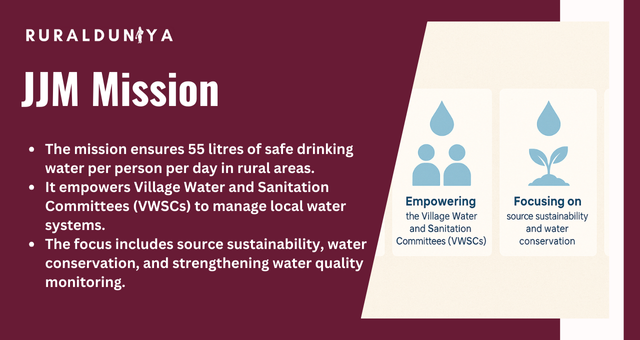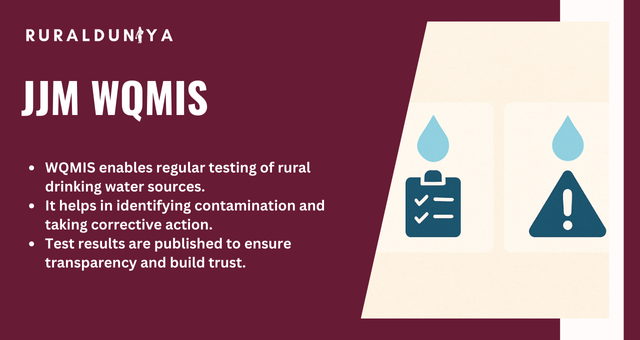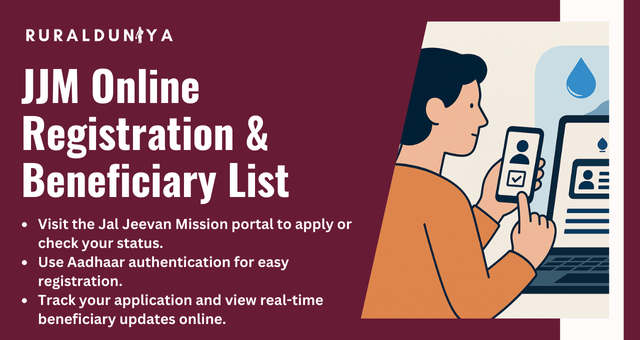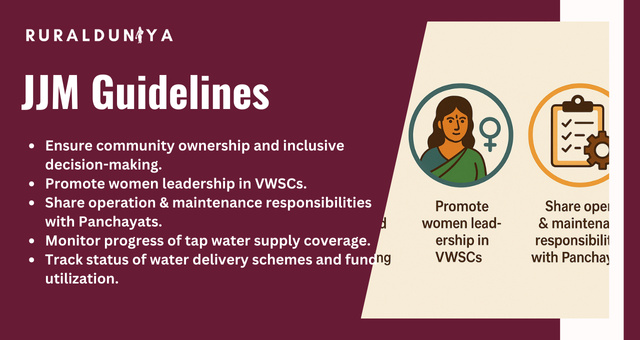JJM – Jal Jeevan Mission is India’s ambitious initiative to bring safe, running water to every rural household. Water is life — yet for decades, millions of families didn’t have access to it at home. From fetching water in buckets to turning on a tap at home, the difference is life changing.
What is JJM All About?

Ever wondered how life would be without water at your doorstep? That’s exactly what the JJM – Jal Jeevan Mission is changing for millions of rural households in India.
Launched on 15 August 2019, this flagship initiative under the Ministry of Jal Shakti aims to provide functional household tap connections (FHTCs) to every rural home by 2024. 💧
The mission delivers more than just water—it brings health, dignity, and convenience. Over 13 crore rural households have already received connections as of 2024. It is a game-changer for India’s rural water supply system.
JJM Har Ghar Jal
“Har Ghar Jal” is no longer just a vision—it’s a movement: 🏠💧
💪 Empowering rural India with reliable water access.
👩👧 Easing the burden on women and children.
🧼 Ensuring sanitation and reducing waterborne diseases.
Every household water connection is a step toward self-reliant villages.
What’s in a Water Supply Scheme?
A typical rural water supply scheme includes: 🏗️
✅ Tap-to-source pipelines.
💧 Overhead tanks and water treatment plants.
📋 Quality monitoring and chlorination units.
All of this ensures safe drinking water access, tailored to local needs.
JJM Mission

The core of the mission is to ensure a sustainable water supply scheme across rural India:
💧 Guaranteeing 55 litres per person per day of safe drinking water.
👥 Empowering the Village Water and Sanitation Committees (VWSCs).
🌱 Focusing on source sustainability and water conservation.
🧪 Strengthening water quality testing and monitoring frameworks.
It’s a holistic approach that includes planning, implementation, operation, and maintenance of water delivery systems.
JJM Tap Connections
The goal? Tap water in every household. Whether it’s a home, school, Anganwadi, or a primary health center, it ensures that safe and adequate water reaches every corner. 🚿
These household water connections help reduce water-fetching burden on women and children and ensure improved hygiene.
JJM IMIS
The Integrated Management Information System (IMIS) is a digital tool used to: 💻
- Monitor progress of tap water supply coverage.
- Track status of water delivery schemes and fund utilization.
- Provide real-time access to data on water infrastructure.
You can explore detailed information about your district or village on the portal (ejalshakti.gov.in).
JJM WQMIS

Clean water is non-negotiable. The Water Quality Management Information System (WQMIS) supports: 💦
📋 Regular testing of drinking water sources.
⚠️ Identifying and responding to contamination.
🧪 Publishing test results for transparency and trust.
It’s part of mission’s strong focus on drinking water quality assurance.
JJM Dashboard Reports
The dashboard report offers a dynamic view of the mission’s status: 📊
- Connections given by state, district, or Gram Panchayat.
- Fund allocation and expenditure.
- School and anganwadi water coverage.
It brings accountability and data-backed decisions into India’s rural water program.
eJalshakti Portal
From registrations to reports, the eJalshakti portal is the go-to place for: 🧑💻
- Viewing Jal Jeevan Mission beneficiary lists.
- Downloading progress and quality reports.
- Monitoring tap connection coverage.
It’s accessible to citizens, engineers, and government stakeholders.
JJM Online Registration & Beneficiary List

Want to check your status or apply? 📝👀
- Head to the Jal Jeevan Mission portal.
- Use Aadhaar authentication to register.
- Check your name in the Jal Jeevan Mission village-wise beneficiary list.
You can also see real-time updates and track application status online.
How Different States Are Performing
Madhya Pradesh (JJM MP)
- ✅ 85%+ households covered.
- ☀️ Use of solar pumps in remote tribal areas.
Uttar Pradesh (JJM UP)
- 📈 2.6 crore households targeted.
- 🏞️ Focus on Bundelkhand and water-scarce zones.
Assam (JJM Assam)
- 🏔️ Innovative gravity-fed and rainwater harvesting models.
- 💧 Tackling arsenic and fluoride contamination.
Karnataka (JJM Karnataka)
- 🌐 98% coverage with smart tech integration.
- 💡 IoT and sensor-based supply systems.
Rajasthan (JJM Rajasthan)
- 🌵 Focus on groundwater recharge.
- 🏠 60 lakh homes connected in arid zones.
These state-wise updates show how water supply schemes adapt to local challenges.
JJM Village Profile
Each village now has a Jal Jeevan Mission village profile featuring: 📌
- Maps of piped water coverage.
- Functionality status of infrastructure.
- Usage stats and complaint redressal.
This transparency helps in community-led monitoring.
JJM Guidelines

The latest guidelines (2023) aim to: 🗂️
- Ensure community ownership and inclusive decision-making.
- Promote women leadership in VWSCs.
- Share operation & maintenance responsibilities with Panchayats.
Final Thoughts
The Jal Jeevan Mission – JJM is transforming India’s rural landscape, one tap at a time. With community ownership, digital governance, and a strong focus on drinking water quality, it is setting a global example. 💬
So whether you’re from Rajasthan’s deserts or Assam’s hills, one thing’s clear — Har Ghar Jal is here to stay. 💙
FAQs
What is Jal Jeevan Mission?
It is a government scheme launched in 2019 to provide every rural household in India with a tap water connection by 2024.
How can I check if my village is covered under Jal Jeevan Mission?
You can visit the eJalshakti portal, go to the Beneficiary List section, and search by your village or district name.
Is the water under Jal Jeevan Mission tested for quality?
Yes, water is regularly tested through WQMIS, and over 22 lakh samples have been checked to ensure safety.
Can I apply online for a tap connection under Jal Jeevan Mission?
Yes, you can register on the portal using your Aadhaar and mobile number and track your application status online.

Nishank is a social impact enthusiast with a solid foundation in public policy, micro-enterprise, and agribusiness. Growing up in a farmer’s family has given him a profound connection to rural communities, fueling his passion to empower people towards self-reliance. He completed his undergraduate studies at the Delhi University and earned a master’s degree in Rural Management from National Institute of Rural Development & Panchayati Raj in Hyderabad.




Kanishth abhiyanta jjm water supply pump operator